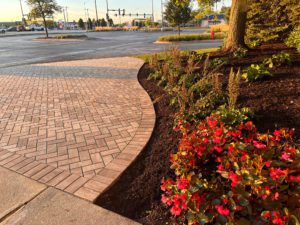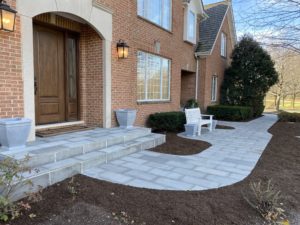Interlocking concrete pavers, such as those used in patios, driveways, walkways, and hardscape designs, are porous, which means they will absorb water over time. They can also absorb other liquids, like oils and grease, which can leave them stained and unsightly. Sealing pavers can protect against wear and deterioration by providing a barrier to prevent staining, which can enhance their appearance and protect your investment.
Choosing a Sealer
The type of sealer that is used really depends on the paver type and the client’s preference. For example:
- A natural look or matte finish accentuates the natural color and texture of the paver
- A clear look or semi-gloss sealer
- A color boost, which is a matte finish but amplifies the paver’s colors, or
- A wet look or high-gloss finish
- Regardless of your choice, all these sealers can offer UV and stain protection.
The Process
 Sealing pavers requires several steps, including choosing the right time of year to do it. Spring and fall are usually the best time. The temperature cannot be too hot or cold because drying times are needed between steps, like right after cleaning the pavers and following the actual sealing.
Sealing pavers requires several steps, including choosing the right time of year to do it. Spring and fall are usually the best time. The temperature cannot be too hot or cold because drying times are needed between steps, like right after cleaning the pavers and following the actual sealing.
The first step in our process is to clean the pavers using a special solvent , which can remove any stains like rubber, oil, grease, or efflorescence (a white, powdery substance that is the result of salt deposits). However, different methods and solvents are used depending on the type of existing stains on the paver surface.
Depending on the size of the area, cleaning the surface can take approximately a day (possibly longer, based on the square footage of the paver surface). The drying time ranges from 24 to 48 hours before the sealer is applied.
Once the sealing process is complete, we recommend avoiding foot traffic on the pavers for about 24 hours. For vehicle traffic, wait about 48 hours to allow the sealer to properly cure.
How Often Should You Seal Your Pavers

When we install new pavers for a client, we recommend giving the pavers some time to complete the curing process. Doing so allows the pavers to naturally absorb and release water. It also provides time for efflorescence that naturally occur within the concrete forming process to escape too. Sealing the pavers too quickly can trap these salts and vapors inside the paver, distorting and discoloring their original beauty.
We recommend cleaning and resealing pavers every 3-5 years, especially if it’s a residential application that has previously been sealed with a solvent-based sealer. Depending on the traffic area (pedestrian versus vehicle traffic), pavers in a commercial property setting should be cleaned and sealed every 1-3 years. Permeable paver applications require additional maintenance procedures including frequent power sweeping and vacuuming to prevent the permeable chipstone from clogging.
If you’re interested in learning more or receiving a quote to have your pavers evaluated, cleaned, and sealed, please contact us.

